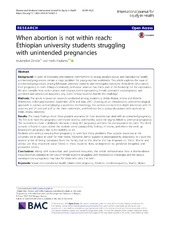| dc.contributor.author | Haukanes, Haldis | |
| dc.contributor.author | Zenebe, Mulumebet | |
| dc.date.accessioned | 2020-03-30T07:08:02Z | |
| dc.date.available | 2020-03-30T07:08:02Z | |
| dc.date.issued | 2019-01-28 | |
| dc.Published | Haukanes H, Zenebe M. When abortion is not within reach. Ethiopian university students struggling with unintended pregnancies. International Journal for Equity in Health. 2019;18:23 | eng |
| dc.identifier.issn | 1475-9276 | |
| dc.identifier.uri | https://hdl.handle.net/1956/21625 | |
| dc.description.abstract | Background In spite of increasing international commitment to young people’s sexual and reproductive health, unintended pregnancies remain a major problem for young women worldwide. This article explores the issue of unintended pregnancies among Ethiopian university students and investigates narratives of students who carried their pregnancy to term. Ethiopia’s relatively permissive abortion law forms part of the backdrop for the exploration. We also consider how socio-cultural and religious norms surrounding female premarital sex/pregnancy, and gendered and urban-rural inequities, play a role in how students handle the challenge. Methods The article is based on research conducted among students at Addis Ababa, Jimma and Mekelle Universities in Ethiopia between September 2016 and June 2017. Drawing on an interpretative, phenomenological approach to science and employing a qualitative methodology, the authors conducted in-depth interviews with 53 students and 24 selected staff at the three universities, and held two focus group discussions with students at Addis Ababa University. Results The study findings show three possible scenarios for how students can deal with an unwanted pregnancy. The first is to have the pregnancy terminated secretly, and thereby avoid the stigma linked to premarital pregnancy. The second is to make a deliberate decision to keep the pregnancy and face the consequences to come. The third scenario is found in cases where the student seems paralyzed by feelings of shame, and where she ends up keeping the pregnancy due to her inability to act. Students who end up carrying their pregnancy to term face many problems. Few support structures at the university are in place to cater for their needs. Moreover, family support is endangered by pregnancy, as it puts the student at risk of being ostracized from her family due to the shame she has imposed on them. Shame and silence are thus important social forces in these students’ lives, underpinned by gendered inequities and patriarchal norms. Conclusions Along with rural-urban and gendered inequities, the article demonstrates how a shame-silence nexus forcefully operates in the lives of female students struggling with reproductive challenges, and the serious consequences a pregnancy may have for those who carry it to term. | en_US |
| dc.language.iso | eng | eng |
| dc.publisher | BioMed Central | eng |
| dc.rights | Attribution CC BY | eng |
| dc.rights.uri | http://creativecommons.org/licenses/by/4.0/ | eng |
| dc.subject | Sexual and reproductive health | eng |
| dc.subject | Unintended pregnancy | eng |
| dc.subject | Abortion | eng |
| dc.subject | Gender inequalities | eng |
| dc.subject | Shame | eng |
| dc.subject | Silence | eng |
| dc.title | When abortion is not within reach. Ethiopian university students struggling with unintended pregnancies | eng |
| dc.type | Peer reviewed | |
| dc.type | Journal article | |
| dc.date.updated | 2020-01-16T14:59:57Z | |
| dc.description.version | publishedVersion | |
| dc.rights.holder | Copyright 2019 The Author(s) | eng |
| dc.identifier.doi | https://doi.org/10.1186/s12939-019-0925-2 | |
| dc.identifier.cristin | 1675058 | |
| dc.source.journal | International Journal for Equity in Health | |
| dc.relation.project | Norges forskningsråd: 249686 | |

